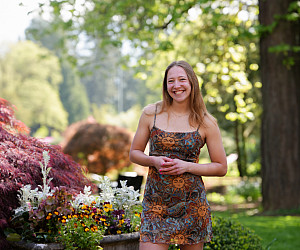main content Cracking the Genomic Code
New research by Sharon Torigoe and several undergraduates is among the first to confirm a characteristic of gene expression important for establishing and maintaining naive-state pluripotent stem cells. Their findings may lead to advances in regenerative medicine.
Stem Cell Discoveries

At the earliest stage of development, cells have remarkable potential—they can become any type of cell in the body. These early cells are known as pluripotent stem cells. In their first stage, called the naive state, they hold the capacity to form all the specialized cells needed to build an entire organism.
What guides this transformation is the expression of certain genes. For example, a skin cell develops because certain genes switch on and direct the cell to become skin.
At Lewis & Clark, a research lab is studying a gene called Klf4, which plays a key role in keeping pluripotent stem cells in their naive state. The team is investigating specific parts of DNA, known as enhancers, that help control how Klf4 and other important genes get turned on and off.

Credit: Steve Hambuchen“Understanding how gene expression is controlled in pluripotent stem cells is important for being able to harness these cells in medical applications, particularly regenerative medicine, where there is potential to produce new tissues for patients,” said Sharon Torigoe, assistant professor of biology at Lewis & Clark and the principal researcher.
To function, enhancers are interpreted by transcription factors, or proteins, that bind to DNA sequences and then signal to other factors about whether to express a target gene. Several transcription factors are involved in the enhancers that initiate the process of activating Klf4 expression, and the central ones are OCT4 and SOX2.
Through experiments, Torigoe and her students observed that the binding sites in Klf4 enhancers for the transcription factors OCT4 and SOX2 were “low affinity.” In other words, the transcription factors did not bind very well to the enhancer sequence. They were initially surprised by this finding, but eventually confirmed that this “low affinity” was crucial for driving the naive-state specific activities of the enhancers for Klf4. In fact, further experimentation demonstrated that if they replaced the binding sites with better, high-affinity versions, the Klf4 enhancers did not function optimally. They have published their findings in a PLOS ONE article called: “A suboptimal OCT4-SOX2 binding site facilitates the naïve-state specific function of a Klf4 enhancer.”
“We found that the low affinity of the binding sites for the central transcription factors were crucial for specifying enhancer function,” says Torigoe. “Our work suggests that the affinity of OCT4-SOX2 binding sites could facilitate enhancer functions in specific states of pluripotency.”
Advancing Knowledge of Gene Expression
When Torigoe and her students dug through the literature, they found that researchers had previously observed similar functions for low-affinity transcription factor binding sites in other enhancers and organisms. To Torigoe’s knowledge, her work is among the first to confirm the importance of low-affinity binding sites for an enhancer in naive-state pluripotent stem cells.
“The genome contains a huge amount of information that makes an organism function, and we know so little about it, even the parts that we thought we knew,” says Torigoe. “We’ve known about enhancers since the 1980s, and we still have much to understand about them.”
This research advances scientists’ knowledge of the mechanisms of gene expression more broadly.
“We have so much ability to sequence genomes now, but we do not yet understand what all of that information means,” says Torigoe. “Gaining insights into enhancers, from a sequence viewpoint, will help us to interpret any genome, whether for new organisms to understand evolution or for patients to understand the genetic basis of human disease.”
Research Experience Leads to Science Careers
Torrey Lind BA ’22 was one of five L&C undergraduate students who worked with Torigoe on this research. Along with Torigoe, Lind and her fellow alumni—Jack Waite BA ’23, RuthMabel Boytz BA ’20, Alexis R. Traeger BA ’21, and Koya Lumbao-Conradson BA ’19—are named as coauthors of the PLOS ONE paper.
“I was drawn to Dr. Torigoe’s research given my interest in epigenetics and understanding the fundamental principles of development as it relates to disease and medicine,” said Lind who majored in biochemistry and molecular biology and minored in neuroscience.
My research in Dr. Torigoe’s lab involved a wide range of molecular biology techniques. This experience was not only exciting and fulfilling—it has set me up exceedingly well for a career in research. I’ll forever be grateful to Dr. Torigoe for her investment in me.
My research at Lewis & Clark prepared me for the position that I took right after graduation. Having this independent research experience helped my application stand out and enabled me to make meaningful contributions to the lab that I joined.
Dr. Torigoe’s mentorship equipped me with an enriched understanding of gene regulation and advanced laboratory methods in genetic engineering. She really challenges her students with independence and responsibilities that only a small lab is able to provide.
Lind’s honors thesis was centered around investigating the genetic elements that coordinate stem cell function and development, with a key emphasis on the frameworks sustaining pluripotency. Lind, who is now a synthetic biology and bioconversion research technician at the National Renewable Energy Laboratory (NREL) in Golden, Colorado, cites Torigoe’s mentorship as pivotal for setting her up for success in the field.
“Dr. Torigoe’s mentorship equipped me with an enriched understanding of gene regulation and advanced laboratory methods in genetic engineering—necessary requirements for my work at NREL,” says Lind, who plans to enter graduate school in fall 2025.
Boytz, who is currently pursuing a PhD in microbiology at Yale University, believes her work with Torigoe prepared her well for the job market and for further studies.
“Through my research with Dr. Torigoe, I was able to present a poster and give an oral presentation at two local research conferences in the greater Portland area,” says Boytz. “The whole experience solidified my intention of pursuing a PhD in microbiology and eventually a career in scientific research.”
Waite’s experience in Torigoe’s lab gave him insight into what graduate school would entail.
“This research opportunity primed me to think and work like a scientist: I had to get familiar with the most recent literature, troubleshoot things when experiments went awry, collect and interpret data, and learn how to communicate my data to the scientific community,” says Waite, currently a postbaccalaureate research fellow at the National Institutes of Health (NIH). “These real-world skills are difficult to teach in a classroom setting, but have proved essential in obtaining and succeeding in my current position at NIH.”
As a result of this advanced research environment, students like Lind gain invaluable hands-on experience, setting them apart from their peers.
“I work with a team of PhD scientists, and they are all amazed at the level of competency and experience I had coming into my internship, especially considering how small Lewis & Clark is,” says Lind. “Dr. Torigoe really challenges the students who work in her lab with independence and responsibilities that only a small lab can provide.”
Biology John S. Rogers Research Program
More Stories

Dance Moves
NYC-Based Dance Company In Step With L&C Students
The Tiffany Mills Dance Company, named for and headed by L&C’s visiting professor and director of dance, took part in a spring residency on campus, leading a series of community dance workshops and performing The Viola Trilogy alongside students.

Groundbreaking Science
A Quantum Leap for Physics Students
Ben Olsen, assistant professor of physics, is establishing Lewis & Clark’s first Quantum Information Science and Engineering lab to probe how unusual types of matter behave at the subatomic level. But first he and his students have to build “The Apparatus.”

Immersive Learning
Voices of Vietnamese Portland
Nhân Hàn BA ’27 and Thoan Nguyễn BA ’27, with project manager Zoë Maughan BA ’19, curated a 15-panel, bilingual traveling exhibit highlighting stories from Vietnamese Portland: Memory, History, Community, an archive documenting experiences of Vietnamese Portlanders.

Graduation Countdown
Senior Speaker: Katie Ingersoll BA ’25
Katie Ingersoll BA ’25 will address graduates at the College of Arts and Sciences commencement on May 10.



